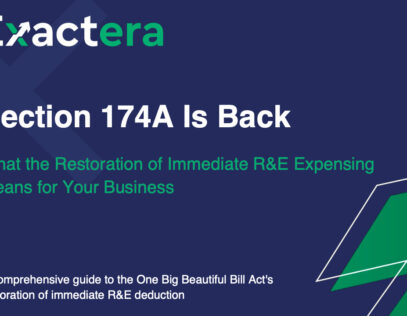On May 22, 2025, the U.S. House of Representatives approved H.R. 1, also known as the “One Big Beautiful Bill Act” (OBBBA). The U.S. Senate is currently considering the House Bill, and the administration has a goal of the bill’s enactment on July 4, 2025.
The House Bill includes many tax-related proposals that would extend or make permanent select corporate, international, and individual tax provisions. Should the House Bill pass, one area that would be highly impacted is rules surrounding the R&D tax credit.
First, and highly anticipated, the House Bill temporarily repeals R&D expense capitalization for domestic R&D expenses. In addition, the House Bill permanently extends many of the tax provisions initially introduced by P.L. 115-97, more commonly known as the “Tax Cuts and Jobs Act” (TCJA) and it introduces other significant income tax changes.
Amortization of Research or Experimental Expenditures
Current Law
Beginning in 2022 and under current law, taxpayers must treat research or experimental expenditures as chargeable to a capital account and amortized over five years (15 years for foreign research). Additionally, taxpayers must treat all software development costs as research or experimental expenditures under IRC Section 174. This change significantly increased taxpayers’ administrative and tax burdens, creating roadblocks for incentivizing innovation.
Proposal
The Bill suspends required capitalization under IRC Section 174 of domestic research or experimental expenditures for amounts paid or incurred in tax years beginning after December 31, 2024, and before January 1, 2030. Instead, the Bill would enact IRC Section 174A, a new, temporary section which would allow taxpayers to (1) deduct domestic R&D expenditures, (2) capitalize and recover domestic research or experimental expenditures ratably over no less than 60 months, beginning with the midpoint of the tax year in which the expenditures are incurred, or (3) capitalize and recover domestic R&D expenditures over 10 years.
Like IRC Section 174, new IRC Section 174A would treat any amount paid or incurred for software development as a research or experimental expenditure. The House Bill also does not disturb the current law requirement under IRC Section 174 to capitalize and amortize foreign research or experimental expenditures over 15 years. Taxpayers may not recover foreign capitalized research or experimental expenditures, either as a deduction or a reduction to the amount realized for any property disposed of, retired, or abandoned after May 12, 2025.
For tax years beginning after December 31, 2024, and before January 1, 2030, taxpayers would be required to reduce domestic research or experimental expenditures by the amount of their Section 41 research credits, or, alternatively elect to claim a reduced Section 41 research credit under a conforming amendment to IRC Section 280C(c).
The House Bill would treat a change to deduct under IRC Section 174A domestic research or experimental expenditures paid or incurred in tax years beginning after December 31, 2024, as an automatic accounting method change made on a cutoff basis. This means an IRC Section 481(a) catch-up adjustment would not be permitted or required. The House Bill would also treat a change to capitalize and amortize under IRC Section 174 domestic research or experimental expenditures paid or incurred in tax years beginning after December 31, 2029, as an automatic accounting method change made on a cutoff basis.
Effective Date
For amounts paid or incurred for domestic research in tax years beginning after December 31, 2024, and before January 1, 2030, IRC Section 174 would be suspended, and IRC Section 174A would be effective. The House Bill would make the conforming amendments permanent, and the changes to IRC Section 280C(c) would apply to tax years beginning after December 31, 2024. The amendment to IRC Section 174(d) would apply to property disposed, retired, or abandoned after May 12, 2025. The House Bill would authorize the Secretary to issue guidance at a later date for short tax years beginning after December 31, 2024, and ending before the date of enactment.
R&D Expensing: Senate’s Push for Permanency
One of the biggest items of note from the upcoming Senate review is the Senate’s strong push to make full R&D expensing permanent. This is a major development. While the House Bill includes a five-year window for immediate expensing of R&D costs, Senator Daines of Montana emphasized this type of temporary treatment creates uncertainty. He argued businesses can’t plan long-term around temporary tax rules, and permanency provides the certainty that drives real investment and innovation.
Impact on R&D Tax Credit
The One Big Beautiful Bill Act is being closely watched as it is now being considered by the Senate. This piece of legislation has the potential for widespread changes to tax planning strategies. The restoration of the immediate expensing of domestic research expenses starting in tax year 2025 would be a welcome relief and would significantly impact taxable income for taxpayers. For taxpayers conducting research outside the United States, however, the provision would not provide any relief from capitalization or cost-recovery restrictions for foreign expenditures. Additional benefits related to the reinstatement of immediate expensing of the R&D tax credit include reduced compliance burdens and simplified tax filings as well as increased R&D investment as the effective cost of domestic research would be reduced.









